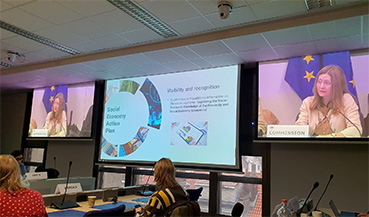The Group of Experts on Social Economy and Social Enterprises (GECES) of the European Commission held its last in-person meeting before the European Elections on December 5. Chaired by Anna Athanasopoulou, Head of Unit for Proximity, Social Economy, and Creative Industries at the Commission, the meeting brought together over sixty participants from EU member countries.
The meeting provided updates on the progress of implementing the European Action Plan for Social Economy, approved in December 2021. One of the key action areas was related to increasing Visibility and Recognition, operationalized through a report aimed at obtaining quantitative and qualitative information about the European social economy. The report, administratively managed by the European agency EISMEA under the title “Improving the socioeconomic knowledge of proximity and social economy,” is being jointly developed by CIRIEC, EURICSE, and with the support of Spatialforsight.
The second point, also linked to the implementation of the European Action Plan, was the presentation of the new portal of the European Commission’s social economy, called the Social Economy Gateway, which is now fully operational. It serves as a central resource and information hub for European institutions and funding sources at both the European and national levels. It is subject to continuous updates.
The presentation of progress in implementing the pathway toward a more resilient, sustainable, and digital proximity industrial ecosystem and social economy was the third agenda item. The commitments to the Transition Pathway were of particular interest.
During the meeting, the Recommendation on frameworks for promoting social economy by the Council of the European Union and the Directive on cross-border European association and non-profit organizations were also presented. A contextual study was presented beforehand.
The next agenda item focused on the presentation of the OECD report on labels and certifications relevant to the European social economy.
The current composition of the GECES expert group concludes its 6-year term in 2024. After the European Elections, its composition will be renewed. During this period, the group changed its name from being solely called the group of experts on social enterprises to the group of experts on social economy and social enterprises.
The next item involved the presentation of the activities carried out by the Spanish Presidency of the Council of the European Union and the Government of Spain in the field of social economy. This presentation was delivered by Visitación Álvarez and Maite Martínez from the Ministry of Labor and Social Economy. GECES members positively evaluated the progress made in Spain in this field and its international leadership.







